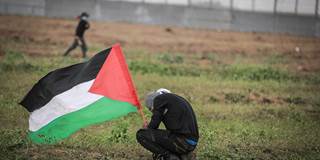The Israeli general election should have given Israelis an opportunity to choose between war and peace. Instead, Israelis will have a choice between war and more war, between occupation and more occupation, even if the candidates avoid using those terms.
AMMAN – A bizarre election campaign is heating up in Israel. The incumbent prime minister, Binyamin Netanyahu, has become the first candidate in the country’s history to seek reelection while facing criminal indictments. Meanwhile, the most important topic – the occupation of the Palestinian territories – has not been mentioned, with candidates instead competing over who can be tougher on the Palestinians.

AMMAN – A bizarre election campaign is heating up in Israel. The incumbent prime minister, Binyamin Netanyahu, has become the first candidate in the country’s history to seek reelection while facing criminal indictments. Meanwhile, the most important topic – the occupation of the Palestinian territories – has not been mentioned, with candidates instead competing over who can be tougher on the Palestinians.